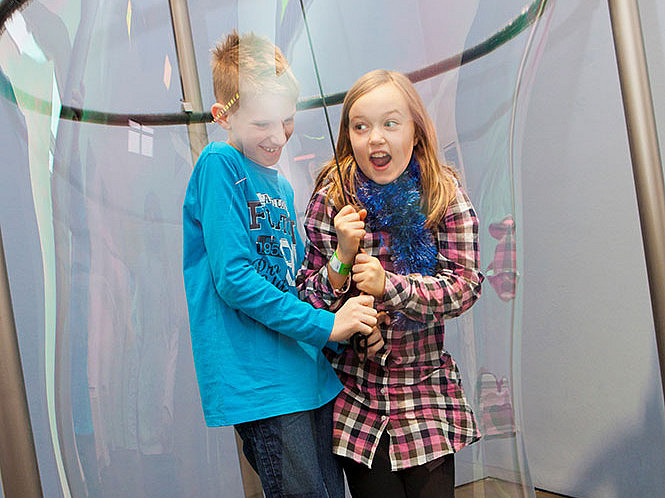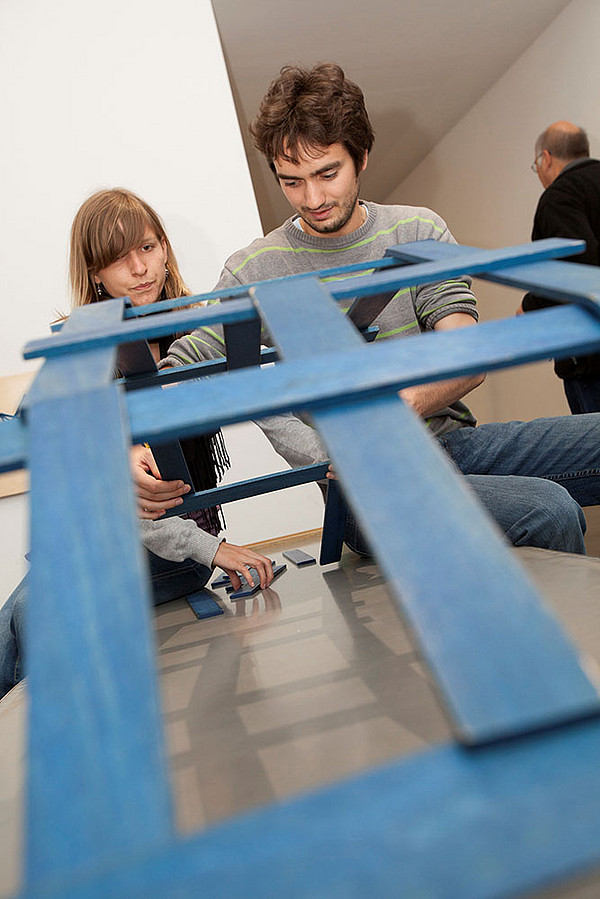Eine Brücke bauen ohne Nägel, Schrauben oder Schnüre, wie Mozart ein Menuett komponieren, Geheimcodes knacken: Die von der Universität Graz initiierte Ausstellung „Mathematik zum Anfassen“, die von 25. März bis 12. April 2019 täglich im Festsaal des Augustinums läuft, macht das Fach für alle Altersstufen auf unkonventionelle Art zugänglich. „Wir wollen Lust auf die Materie machen und den BesucherInnen beim Experimentieren zu interessanten Aha-Erlebnissen verhelfen“, betont Fachdidaktiker Bernd Thaller, der mit seinen Studierenden die Schau vorbereitet hat und begleitet. An den 19 Stationen kann man ausprobieren, knobeln und staunen – wenn man etwa herausfindet, warum die kürzeste Bahn einer Kugel nicht immer die schnellste ist, oder sich selbst als Funktion erlebt.
„Mathematik ist zu Unrecht viel zu oft negativ behaftet. Das liegt auch daran, dass es in der Schule zu selten gelingt, eine sinnvolle Verbindung zur Lebenswelt der Jugendlichen herzustellen“, schildert Thaller. Der Leiter des Fachdidaktikzentrums für Mathematik und Geometrie der Universität Graz erforscht Wege, diese Situation zu verbessern, nicht zuletzt im Hinblick auf den großen Mangel an AbsolventInnen mathematisch-naturwissenschaftlicher Studien. „Es ist wichtig zu verdeutlichen, dass das Fach nicht nur mit Formeln und Rechnen zu tun hat, sondern Kreativität beim Suchen nach Lösungen gefragt ist. Mit unkonventionellen Blickwinkeln, Experimenten und Hintergrundgeschichten lässt sich auch Spaß an der Sache vermitteln“, so der Wissenschafter. Ein kleiner Baustein dazu ist die Ausstellung im Augustinum, die aus Exponaten des weltweit einzigen Mathematik-Museums in Gießen besteht. Thaller hat deren Wirkung auf die BesucherInnen beforscht und festgestellt, dass sich die Einstellung zur Mathematik nachhaltig verbessert hat.
Die Schau, die besonders für Kinder ab sechs Jahren und Erwachsene geeignet ist, wurde in Zusammenarbeit mit der TU Graz und den pädagogischen Hochschulen realisiert.
Ausstellung „Mathematik zum Anfassen“
25. März bis 12. April 2019
Festsaal des Augustinums, Lange Gasse 2, 8010 Graz
Öffnungszeiten: Mo bis Fr: 8 bis 17 Uhr, Sa und So: 10 bis 16 Uhr
Eintritt: 5 Euro
Letzter Einlass ist jeweils eine halbe Stunde vor dem Ende der Öffnungszeit.

